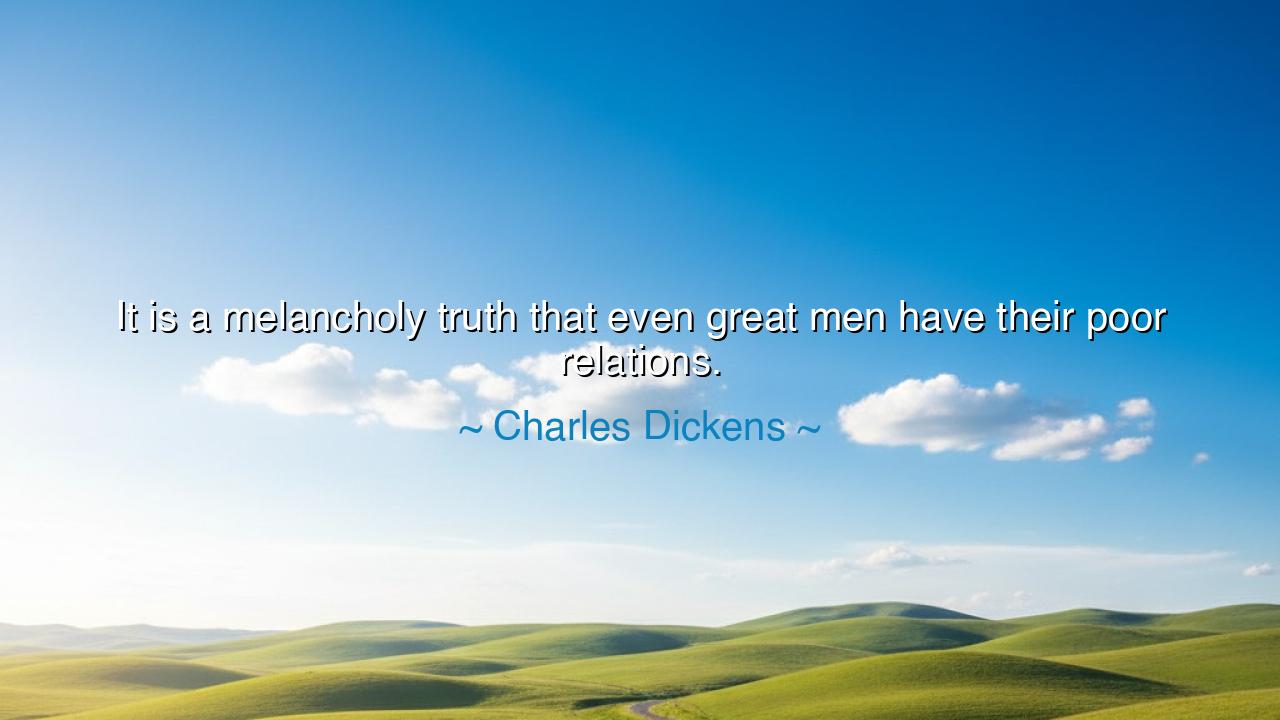
It is a melancholy truth that even great men have their poor






Hear, O seekers of wisdom and compassion, the somber yet tender words of Charles Dickens, who wrote: “It is a melancholy truth that even great men have their poor relations.” These words, though wrapped in irony, strike at the heart of human pride and social hypocrisy. They remind us that no greatness is untouched by the shadow of humility, that behind every noble name or shining achievement lies a lineage bound by imperfection, dependence, and shared humanity. It is a truth both humbling and revealing—that even the highest branches of the tree are nourished by roots that lie deep in the soil of struggle.
Dickens, the great observer of human life, penned these words in the opening of Bleak House—a novel that unravels the illusions of wealth, class, and moral superiority. He had seen the world of Victorian society, where the rich paraded their gentility and concealed their kin who lived in poverty. To say “even great men have their poor relations” was not merely to note a social fact; it was to expose the vanity of those who believe success can sever them from their origins. For Dickens knew that blood cannot be refined by fortune, nor kinship erased by shame. The poor relation, often scorned or pitied, is a mirror held before pride, showing the fragility of man’s worldly standing.
This “melancholy truth” also reveals a deeper wisdom: that greatness and poverty coexist not only in families, but within the soul of every human being. Each of us carries both—the noble and the needy, the strong and the frail. The poor relation is not merely a person, but a symbol of our forgotten selves—the humble, uncertain part of our spirit that the proud heart tries to deny. The wise, therefore, do not reject their poor relations, but embrace them; for by remembering where they came from, they remain human amidst glory.
Consider the story of Abraham Lincoln, born in a log cabin to a family of simple means. When he rose to the presidency, he carried with him the plain speech, the compassion, and the humility of his upbringing. Others might have hidden their roots; Lincoln wore his as a badge of truth. When ridiculed for his rustic origins, he said simply, “I am not ashamed of my parents, for they were honest people.” His greatness did not come despite his poor relations, but because he honored them. In remembering his past, he governed not as a man above others, but as one of them.
Dickens, too, had lived the pain of poverty. As a child, he worked in a factory while his father languished in debtor’s prison. The memory of that humiliation never left him. It became the seed of his empathy—the fire that made him the champion of the voiceless. He understood that the “poor relation” was not a burden but a teacher, a reminder of life’s moral duty to care for one another. In mocking those who disowned their less fortunate kin, Dickens was not only condemning pride but also defending the sacred dignity of the humble.
Yet, this truth remains “melancholy,” for it reveals how easily love is silenced by vanity. Many who achieve success forget those who walked beside them in obscurity. They fear the reflection of their own past weakness. But such forgetfulness is the beginning of spiritual decay, for no man rises by himself. Behind every “great man” are hands that toiled unseen, hearts that believed in him, and ancestors who endured hardship so that he might climb higher. To deny them is to deny the soil that gave him life.
The lesson, then, is this: remember your poor relations, whether they dwell in your family, your past, or your own heart. Show gratitude to the roots that shaped you, compassion to those who still struggle, and humility in your moments of triumph. If fortune has favored you, let kindness prove you worthy of it. Greatness is not in rising above others—it is in lifting them up beside you.
Thus, through the voice of Charles Dickens, we learn that the true test of greatness is not wealth, nor power, nor fame, but humanity. The wise man does not turn away from his poor relations; he honors them as his truest kin, for they remind him that all are bound by the same fragile thread of life. In this remembrance, pride is dissolved, and compassion is born—and there, in that union of humility and love, lies the only greatness that endures.






AAdministratorAdministrator
Welcome, honored guests. Please leave a comment, we will respond soon